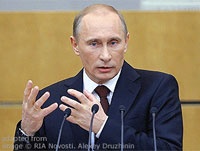A looming 'lost decade'?
Nouriel Roubini, aka 'Dr. Doom,' disagrees with feelgood predictions about
Putin's return
to the Kremlin
Tai Adelaja - Moscow News - themoscownews.com - 2.20.12 - JRL 2012-32
As recently as last July, the Kremlin's then-top political strategist Vladislav Surkov bared his heart in rare public remarks, saying that he "honestly believe[s] that [Prime Minister Vladimir] Putin is a person who was sent to Russia by fate and by the Lord at a difficult time for Russia."
 Before him, Mother Fotina's Chapel of Russia's Resurrection said it views the presidential hopeful as the reincarnation of Paul the Apostle. And last week, Patriarch Kirill, who heads the Russian Orthodox Church, said that Putin's 12-year rule in Russia was a "miracle of God."
Before him, Mother Fotina's Chapel of Russia's Resurrection said it views the presidential hopeful as the reincarnation of Paul the Apostle. And last week, Patriarch Kirill, who heads the Russian Orthodox Church, said that Putin's 12-year rule in Russia was a "miracle of God."
Standing out from this crowd is the famed New York University economics professor Nouriel Roubini, dubbed "Dr. Doom" for his accurate predictions of the 2007-08 financial crash, who this week predicted that Russia faces a "lost decade" when Putin returns to the presidency.
"The economy will stagnate, reform efforts will stumble and Russia will trail its BRIC peers in development when Putin returns to the Kremlin," Roubini said.
Roubini, who met with the Russian prime minister earlier this month, said he expected Putin to again win the presidency, perhaps in the second round, likely setting in motion some form of state-led reform process.
But Roubini said he saw "little in the reform pipeline at the moment," with the implications that "the next two to three years might also be lost from the structural point of view."
"We fear these reforms are likely to be too slow to really shake the Russian economy out of its doldrums," Roubini said.
Putin's Achilles' heel in the future, Roubini stressed, is Russia's commodity driven economy, which remains exposed to global headwinds, particularly lower commodity prices.
"Growth remains consumer-driven, as pre-election fiscal stimulus boosts real wages and disposable income," Roubini said. "A sustained recovery in fixed investment remains elusive, putting a speed limit on growth."
Russia's continued reliance on energy exports will further decrease the competitiveness of the domestic economy, he said. And when indicators like low labor productivity and demographics are factored in, Russia's economy is headed for even slower growth in the coming years. Roubini believes that Putin's ambitious plan to accelerate growth by 6 percent or 7 percent over the next 10 years is unrealistic.
While efforts to intensify reforms could bring some economic effects, they are bound to stumble on problems like aging infrastructure and poor investment climate, he said.
Keywords: Russia, Government, Politics - Russia, Economy - Russia News - Russia
As recently as last July, the Kremlin's then-top political strategist Vladislav Surkov bared his heart in rare public remarks, saying that he "honestly believe[s] that [Prime Minister Vladimir] Putin is a person who was sent to Russia by fate and by the Lord at a difficult time for Russia."
 Before him, Mother Fotina's Chapel of Russia's Resurrection said it views the presidential hopeful as the reincarnation of Paul the Apostle. And last week, Patriarch Kirill, who heads the Russian Orthodox Church, said that Putin's 12-year rule in Russia was a "miracle of God."
Before him, Mother Fotina's Chapel of Russia's Resurrection said it views the presidential hopeful as the reincarnation of Paul the Apostle. And last week, Patriarch Kirill, who heads the Russian Orthodox Church, said that Putin's 12-year rule in Russia was a "miracle of God."
Standing out from this crowd is the famed New York University economics professor Nouriel Roubini, dubbed "Dr. Doom" for his accurate predictions of the 2007-08 financial crash, who this week predicted that Russia faces a "lost decade" when Putin returns to the presidency.
"The economy will stagnate, reform efforts will stumble and Russia will trail its BRIC peers in development when Putin returns to the Kremlin," Roubini said.
Roubini, who met with the Russian prime minister earlier this month, said he expected Putin to again win the presidency, perhaps in the second round, likely setting in motion some form of state-led reform process.
But Roubini said he saw "little in the reform pipeline at the moment," with the implications that "the next two to three years might also be lost from the structural point of view."
"We fear these reforms are likely to be too slow to really shake the Russian economy out of its doldrums," Roubini said.
Putin's Achilles' heel in the future, Roubini stressed, is Russia's commodity driven economy, which remains exposed to global headwinds, particularly lower commodity prices.
"Growth remains consumer-driven, as pre-election fiscal stimulus boosts real wages and disposable income," Roubini said. "A sustained recovery in fixed investment remains elusive, putting a speed limit on growth."
Russia's continued reliance on energy exports will further decrease the competitiveness of the domestic economy, he said. And when indicators like low labor productivity and demographics are factored in, Russia's economy is headed for even slower growth in the coming years. Roubini believes that Putin's ambitious plan to accelerate growth by 6 percent or 7 percent over the next 10 years is unrealistic.
While efforts to intensify reforms could bring some economic effects, they are bound to stumble on problems like aging infrastructure and poor investment climate, he said.